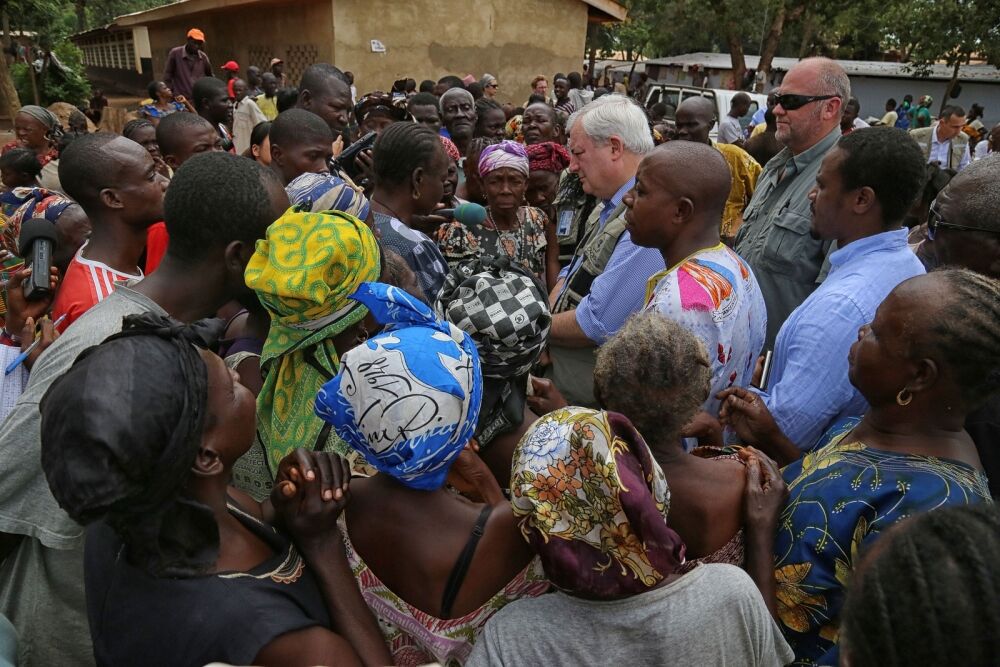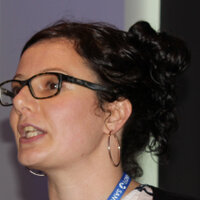Stephen O'Brien, UN-Undersecretary General for Humanitarian Affairs pays a visit to a camp in Saint Saveur, Central African Republic, in August 2016. Photo: © Nektarios Markogiannis/MINUSCA. IRIN Photo
At Health Poverty Action there are a number of things we are proud of. We don’t create parallel systems. We work closely with local authorities, district health committees and national governments to build effective health systems that are appropriate and accessible to those who need them. We look to challenge power imbalances from local to global levels. And we tackle the root causes of poverty without pretending that aid and charity are solutions.
There are a number of other areas to which we are committed, but require ongoing struggle and reflection. Firstly, building solidarity between people in the Global North and South. The aid and charity narrative has presented citizens of the Global North as the generous saviours of the South. This has helped to cement power imbalances; fuel a right wing, aid sceptic agenda; and undermine solidarity. In this age of heighted inequality it is also irrelevant. When the UK NHS is chronically underfunded and facing increased privatisation, to talk about the need for strong health systems in the South, whilst ignoring the demise of one under our noses would be inconsistent. By equating health cooperation with aid, we have fallen into the typical neoliberal ‘divide and rule’ trap - as the growing hostility towards aid demonstrates. We won’t overcome public scepticism by telling positive stories of aid. We need to stop pitting citizens of the North against the South, and engage people wherever they live, on the root causes of poor health that affect us all. This is of course easier said than done for organisations with remits and funding to work in the South. But through partnership and engaging with the campaigns of Northern organisations working on domestic issues, as well as seeking funding to work in the global north, we have begun to take steps towards it.
Redistribution of wealth
Stepping outside the charity frame requires us to tackle the root causes of poor health, not obsess about how to spend aid better. We know that universal access to health will not be achieved through aid. Health systems require the redistribution of wealth. Both through strong national tax systems, and the return of the resources stolen by the rich. Whether it is tax dodging, subsides to big corporations, the war on drugs or the impact of climate change that diverts resources from citizens to global elites and corporations, we need to shift the power back. This means cleaning up tax havens, ending illegitimate debt, making trade deals that promote rather than undermine health, and implementing drug policies that support health and livelihoods, not the failed war on drugs. It means taking that extra money and redirecting it to provide health and public services for all.

Developing a radical vision of the world instead of "inspiring" images of poor people, demands Natalie Sharples. Photo: © WHO/A. Zouiten
When we do talk about aid we need to reconceptualise it as one form of wealth redistribution among many, needed both within and between countries.
We can start by being more honest about what it is. It isn’t health ‘cooperation,’ it’s justice.
And it’s not aid, at best it’s compensation. As long as we continue to perpetuate the notion of aid as charity, we cannot achieve radical change. Reparationis, compensation, global solidarity, token gesture, or redistribution: Whatever we should rename it - we urgently need to decide and keep repeating it.
More than just a token gesture is required
We also need to do more to link our programmatic work to the structural determinants of health. Those of us working with those on the sharp end of neoliberalism need to call it out for what it is. And every time we talk about our work providing services, articulate the political and economic climate driving the need for it. Political sensitivities in various countries often complicate -or in some cases prohibit - this, but the more we try to make the connections, the more we can reshape the picture of what health cooperation is, and situate our practical work in a wider narrative of change.
We could also be better about generating positivity. Our sector tends to be really good at pointing out the problems, less good at defining inspiring solutions. We make people feel overwhelmed and change impossible. By positivity I don’t mean misleading claims about the effectiveness of aid, or ‘inspiring’ pictures of poor people working hard.
I mean articulating a clear, bold and radical vision for the sort of world we want to see, with positive alternatives for change.
There are plenty of examples to draw on. Take Cuba’s health system, Ecuador’s rejection of neoliberalism and subsequent reductions in poverty, or the quality of public services across the Nordic countries. We need to stop making people angry and starting giving them hope.
Finally we need to tackle our privilege problem. We cannot reshape global power dynamics while replicating them within our own organisations. In the UK at least, the sector is noticeably dominated by the white, highly educated and middle class. This has resulted in situations in which groups of privileged people posit solutions to something they have never experienced. We need to put liberation at the heart of what we do. This requires genuinely getting out of our comfort zone and challenging our own perceptions, and our practices. Organisational structures and pay generate questions which we are yet to answer. Do we need to align with the pay of similar organisations to attract the best staff, or do we believe that comfortable salaries for Northern INGO management set us too far apart from the people we work with? Should we consider flat pay or management structures, or adjust our pay to take account of inherited wealth or caring responsibilities? If we believe in wealth redistribution should we be doing more to live it?
There are no easy answers. And with so many contradictions in this line of work, if we are feeling comfortable, there’s probably something wrong. All we can do is feel into the discomfort, remain self-reflective and embrace external challenge. As Teju Cole has said: If we are going to interfere in the lives of others, a little due diligence is a minimum requirement.
This article won the MMI essay-contest "Health cooperation beyond aid - Pathways for change": The winner and the reader



